

A Google a Day. Educators. Teaching Strategies For Improving Student Internet And Keyword Research. Teaching Students To Use Critical Thinking To Find Quality Websites.
The Partnership for 21st Century Skills - EduVision. Scaffolding Methods for Research Paper Writing. Home › Classroom Resources › Lesson Plans Lesson Plan Overview Featured Resources.
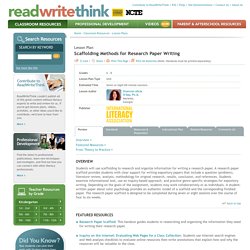
Grading Made Easy with Diigo & Jing. This is a guest post from Rebecca Johnson.

Both Diigo and Jing have been written about on numerous occasions here at the Free Technology for Teachers blog, but I wanted to share my experiences using both tools when grading assignments. I teach an information literacy course for the college where I work as a librarian. This course requires students to create an annotated bibliography as their final project; but there’s one issue that I continually run into time and time again - students would submit their sources throughout the quarter, but when it came time to put the bibliography together, they never could find their sources again which left them scrambling to search for additional content.
This past quarter, I tried something completely different, and it worked beautifully! Sound Advice: Evaluating Web Sites. Determining Website Credibility. Evaluating Web Sites: A Middle School Lesson Plan. Subjects Educational Technology Grade 6-8 [facebookbadge] Brief Description Students learn the six criteria for evaluating Web sites and then use those criteria to locate three sites that provide good information and three that do not.
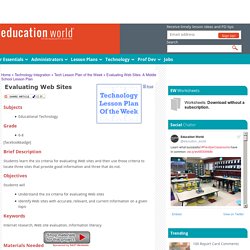
Objectives. Inquiry on the Internet: Evaluating Web Pages for a Class Collection. ReadWriteThink couldn't publish all of this great content without literacy experts to write and review for us.
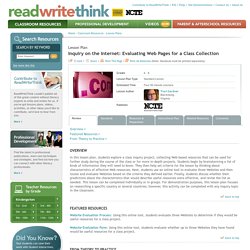
If you've got lessons plans, videos, activities, or other ideas you'd like to contribute, we'd love to hear from you. More Find the latest in professional publications, learn new techniques and strategies, and find out how you can connect with other literacy professionals. Evaluating Websites. Evaluating Web Sites-Five Basic Criteria. Lesson 1: Criteria for Evaluating Web Sites. When making a decision to buy something, you ask yourself several questions: Can I afford it? Is it good quality? Does it fit me? Is it something I need? Do I like the way it looks/tastes/feels/works? Although you may not consciously ask yourself these questions, many of these thoughts may go through your head as you consider various criteria: Price Quality Fit Necessity Look/Feel A Good Fit The same may be applied to Web sites.
Schools, Universities, and Libraries Traditionally, people have used schools, universities, and libraries as sources of information when they have a question or are looking for information. Evaluating Web Sites: Criteria and Tools. Grades 6-8. Save the Web for Later: Help students organize their research with annotation and bookmarking services. About the Research Models. Classroom Strategies. Basic Steps to Creating a Research Project- CRLS Research Guide.
Copyright. Plagairism. Building Good Search Skills: What Students Need to Know. Getty The Internet has made researching subjects deceptively effortless for students — or so it may seem to them at first.
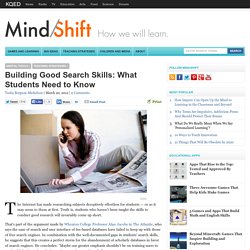
Truth is, students who haven’t been taught the skills to conduct good research will invariably come up short. That’s part of the argument made by Wheaton College Professor Alan Jacobs in The Atlantic, who says the ease of search and user interface of fee-based databases have failed to keep up with those of free search engines. In combination with the well-documented gaps in students’ search skills, he suggests that this creates a perfect storm for the abandonment of scholarly databases in favor of search engines. He concludes: “Maybe our greater emphasis shouldn’t be on training users to work with bad search tools, but to improve the search tools.” His article is responding to a larger, ongoing conversation about whether the ubiquity of Web search is good or bad for serious research.
So what are the hallmarks of a good online search education? Related. Harvard Referencing Tutorial. This extensive FAQ list is provided to help you find answers to many more unusual questions relating to citing references.
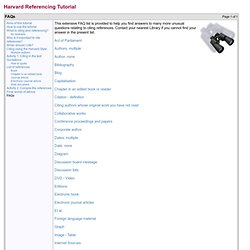
Contact your nearest Library if you cannot find your answer in the present list. Act of Parliament Authors, multiple Author, none. 12 Ways To Use Google Search In School, By Degree Of Difficulty. Sunday, May 6, 2012 8:15 am, Posted by | Updates Topics: , , , , , , I’ve been completely obsessed with Google’s new mini-site devoted to finding better ways to incorporate proper web searches into the classroom.
Dubbed ‘ Search Education ,’Google’s new site has an array of lesson plans, videos (check a sample out below), concept maps, and other tools designed to help any educator properly integrate Google. This is just the logical next step for the search (and basically everything else) behemoth as Google pushes its way into the classroom. As part of Search Education, Google has shared a bunch of lesson plans that are organized by degree of difficulty. So, if you consider yourself and / or your students Google experts, you should try out the more advanced plans.
The following are just some of the many lesson plans brought to you by Google. Choose the Best Search for Your Information Need. Project: An Educational Boolean Web Search Tool. Oolone.com visual search engine. Open your eyes to the web. Search-cube - the Visual Search Engine. WolframAlpha.
Cybersmart - Brochures and posters. Teacher's Guides and Analysis Tool - For Teachers. Critical thinking. Www.richlandcollege.edu/library/rubrics/basicILskills.pdf.